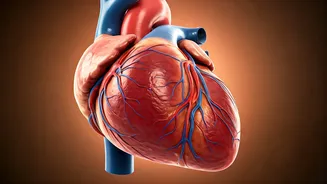Importance of Heart Health
Understanding the significance of heart health is the first step toward a longer life. The heart, a vital organ, functions tirelessly to circulate blood
throughout the body, delivering oxygen and nutrients while removing waste. Maintaining its optimal condition is critical, as heart disease remains a leading cause of mortality globally. Neglecting heart health can lead to various complications, including heart attacks, strokes, and heart failure, diminishing both the quality and duration of life. Therefore, making conscious choices that support heart health is an investment in a healthier, more extended future. This proactive approach allows individuals to reduce risks and enjoy a fulfilling life.
Daily Strength Training
Incorporating strength training into your daily routine offers considerable advantages for heart health. Regular resistance exercises, such as lifting weights or using bodyweight, build and maintain muscle mass. Strong muscles help regulate blood sugar levels, reducing the risk of diabetes, a significant risk factor for heart disease. Strength training also aids in improving cholesterol profiles, increasing the levels of beneficial HDL cholesterol while decreasing harmful LDL cholesterol. Furthermore, it helps control blood pressure, diminishing strain on the heart. Aim for at least two sessions of strength training per week, targeting all major muscle groups. Start with manageable weights and gradually increase the intensity to avoid injury.
The Power of Cardio
Cardiovascular exercise, commonly referred to as cardio, is indispensable for a healthy heart. Activities like brisk walking, jogging, swimming, or cycling strengthen the heart muscle and improve its efficiency. Engaging in cardio regularly helps to lower blood pressure and improve blood flow throughout the body. Cardio exercises also aid in weight management, reducing the strain on the heart. It’s recommended to aim for at least 150 minutes of moderate-intensity cardio or 75 minutes of vigorous-intensity cardio per week. Find activities you enjoy to keep you motivated. Consistency is key, so make cardio a non-negotiable part of your daily or weekly routine.
Heart-Boosting Diet
The food we consume plays a vital role in heart health. A heart-healthy diet emphasizes nutrient-rich foods while limiting unhealthy ones. Focus on consuming plenty of fruits, vegetables, whole grains, and lean proteins, which provide essential vitamins, minerals, and fiber, as well as keeping the blood vessels in good shape. Reduce your intake of saturated and trans fats found in processed foods and red meat. Limit added sugars and sodium, as they can contribute to high blood pressure and other heart-related problems. Incorporating foods rich in omega-3 fatty acids, such as salmon, can also boost heart health. Planning meals and making informed food choices can substantially improve your cardiovascular well-being.
Stress Management Techniques
Managing stress is an overlooked but crucial component of a heart-healthy lifestyle. Chronic stress can elevate blood pressure and increase the risk of heart disease. Employing stress-reduction techniques can protect the heart from these adverse effects. Practices like meditation, deep breathing exercises, and yoga are effective in calming the mind and body. Regular physical activity, such as walking or running, can also help alleviate stress. Ensuring adequate sleep, typically around 7-8 hours per night, is essential for stress management. Building a strong social support network can also provide emotional resilience and assist in managing stress. Making these techniques a daily habit is pivotal for long-term heart health and overall wellness.
Regular Health Checkups
Routine medical checkups are essential for monitoring heart health and identifying potential problems early. Regular visits to your doctor can help detect and address risk factors such as high blood pressure, high cholesterol, and diabetes before they cause significant damage. During these checkups, doctors may perform tests like blood pressure monitoring, cholesterol screenings, and electrocardiograms (ECGs) to assess heart function. Early detection allows for prompt treatment and lifestyle adjustments to mitigate risks. It is crucial to adhere to your doctor's recommendations and to proactively seek medical advice if you experience any symptoms, such as chest pain or shortness of breath. Making regular checkups a priority is a proactive step toward maintaining a healthy heart and ensuring a longer, more vibrant life.












